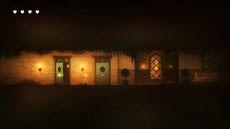David Review – A New Age Boss-battler
David is an allegory; it’s about overcoming the hardships and negativity of life – a fitting theme for a game that’s so tantalizingly difficult. Filled with inventive gameplay and a mesmerizing art-style, David is an imaginative game, and one of the coolest boss-battlers available on iOS.
The titular player-controlled character, David, is a tiny white square who is gifted a world-saving power from a divine hand. If you’ve played Fez, the gifting scene is actually similar to when Gomez receives his fez, and it’s not the only resemblance between the two games. David’s developer Andrew Armstrong produced the (too) small soundtrack for the game, and it oftentimes evokes Disasterpeace’s excellent work on Fez with its ambience and intensity. Even the menus of David are the same kind of pixel-art glyphs seen in Fez.
The divine power in David is a not a hat, however, and is instead a sort of abstract slingshot which is used to take on the game’s nine Goliath-esque, fractal-art bosses. Controls and the basic narrative outline are shown intuitively in a simple, yet effective, intro level. Tap and hold on David to slow time and to charge your slingshot. When he begins to glow (also cued by a sound), drag and release your finger in the direction you wish to fire. On-screen buttons for left, right, and jump are responsive and unobtrusive. There’s also a tilt-control option, but it’s not sensitive enough, nor is it very useful for some of the game’s platforming elements which require speed and timing.
Flee
There were some issues I had with the controls feeling counter-intuitive at times. One level forces players to time a jump carefully in order to avoid two deadly-fast projectiles. Upon death, I would hit restart, and, because the game conditions players to always tap on jump (tapping on jump makes David exponentially more agile and it skips the level-opening cut-scenes), I would instinctively tap jump upon respawn… and head right into the projectiles. It was a small frustration, but a frustration nonetheless. On top of that, sometimes pressing on David will block your vision of part of the screen, and it always just-so-happens to block where an enemy is attacking on the flank. On the unforgiving, hard mode, it’s especially frustrating to die in that way.
The game’s world resembles a glitchscape, occasionally glittering with a rainbow of colors among the otherwise minimal, white and blue outer space backdrop. Separated by a hub area, each of the game’s nine main levels are home to a unique boss and a memorable design, from subtle arena levels, to tricky platform levels. Each is named after a grim, abstract theme, such as “Flee,” “Lies,” or “Wolf,” so beating a level gives players the feeling of ‘conquering’ that concept. It’s a nice touch, and gives David an emotional valence, especially upon defeat of the final level: “Sin.”
The bosses themselves are living compilations of numerous geometric shapes which float around together in a deadly mass, firing projectiles or otherwise chasing down the miniscule David, aiming to poke him into damnation with their sharp angles. Most of these bosses take four or five good hits to be completely destroyed, with the exception of the final boss who takes ten. The enemy AI is predictable in the way it magnetizes projectiles toward the player, but the game’s physics make avoiding hits a bit more fickle.
Brood
In many ways, David is like a classic boss-battler; learn the boss’s movements and find a loophole or, more usually, a game exploit. In some levels you can just chill out in a corner, un-hittable due to the shape of the enemy, and take pot shots. In others, soaking hits (you have a wholly forgiving six hit-points), repeatedly slowing time, and spamming your slingshot is an assured way to kill a boss within seconds. While the standard difficulty mode (aptly named “Okay”) is hardly a challenge, the one-hit-and-you’re-dead “Difficult” mode turns the game into a unique and skill-based boss-battler—and a riot of fun.
With this upped difficulty, David becomes a game of trial-and-error, and you’ll really need to learn the movements of bosses and find their loopholes in order to win; you’ll be spending upwards of half an hour on a level that took you maybe a minute the first time around. The level of difficulty reminded me most of Hotline Miami, where you run in, take out a couple guys and then get flattened. The solutions aren’t wholly linear, and each time you try again, you’ll do just a little bit better; it’s that same feasible and rewarding difficulty that makes a game worthwhile and adds to its lasting appeal. That being said, some levels are still much easier than others, and there’s still only nine—there’s no secondary variation in the design. Fortunately, for those that finish the main levels too quickly (or give up on the hard mode), there’s an incredibly addicting bonus game that’s available from the start.
While devoid of the enormous bosses or interesting level design seen in the main levels, Arena mode introduces RPG elements in an endless arena-battle. The two enemy types in Arena are small versions of the big bosses, and normally take two or three hits to defeat. With each kill, a point is earned, and players can use those points to give David more health, more slingshot ammo, or, with enough points, one of two new powers unseen in the main levels. It’s a welcome addition to a game that might otherwise be dismissed after a short while. There’s even a quirky little bonus “basketball” mode that’s hidden in one of the levels, adding yet a smidgen more to the game’s longevity.
Lies
David is a game filled with ideas. While somewhat polarizing in its strengths and weaknesses, both too easy and too difficult at times, David doesn’t feel cheap. A catchy electronic soundtrack, a gorgeously unique art-style (I mean, just look at it), and some inventive gameplay elements make this not only a great catch for fans of the boss-battling genre, but for anyone seeking a new game for their iOS device— especially for its current, insanely low price point of $1.00.
David is a game. A game about physics and enemies. A game about struggles and life. A game about David.
David is also available on PC and you can help Greenlight the game on Steam. The $1.00 sale price ends in May.






